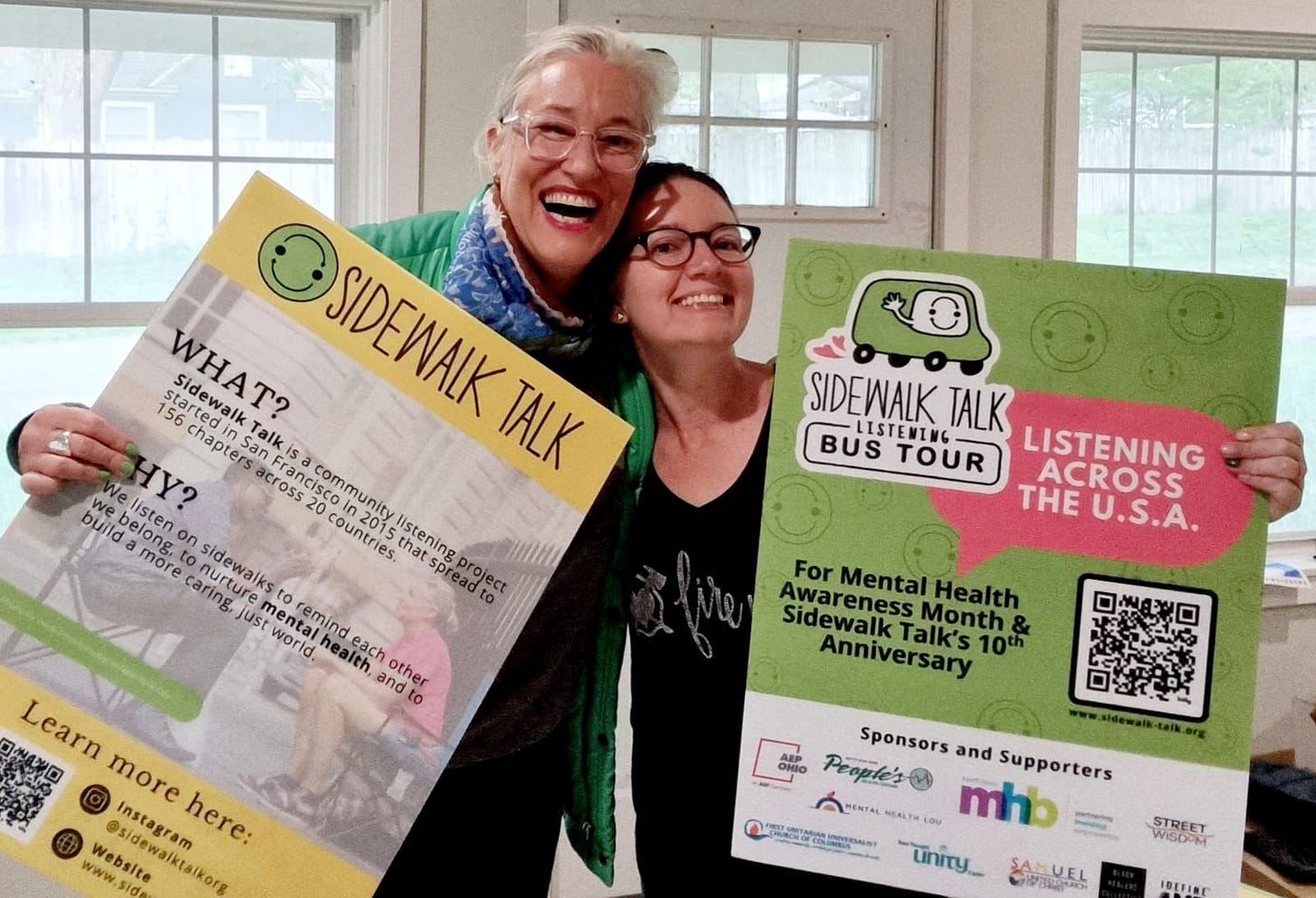
I had this epiphany on the Sidewalk Talk bus tour in May. Training people on how to listen to strangers is not what I do when I hold a listening training - it is more to build the courage to "go find out" about other humans, and add in a lot of delight and love. I remember the first time we hired a professional copywriter to write the Sidewalk Talk website copy. She said, "You have to talk about mental health impact and impact on loneliness." And I did it because "that is what a nonprofit is supposed to do—solve problems." But I didn't start Sidewalk Talk to solve a problem like that.
The truth is, I did not believe what the media was telling us about people. That they were scary, mean-spirited, selfish, rejecting, and evil. Sure, we do bad stuff, but I have always had this weird "go find out for yourself" energy. Always. I love being surprised by someone. I love simple moments of kindness. And I love someone sharing their story, and then suddenly I see the world with more color than before I heard their story, and I feel connected to our shared humanity, not my pea brain self.
I am on the ADHD spectrum like a lot of you. My teachers were subtly intervening in second grade, but I refused the diagnosis, but now that it is less shameful, I own it now. ADHD, plus gifted, plus trauma, makes for a brain that is curious, crazy fast, and wants to be surprised by life. So I have some “natural” talent at this. But with enough personal trauma therapy my brain has also grown the capacity to feel steady in both high-intensity and totally chill moments. Happily, liking chill took a lot of practice and I am there. Wee.
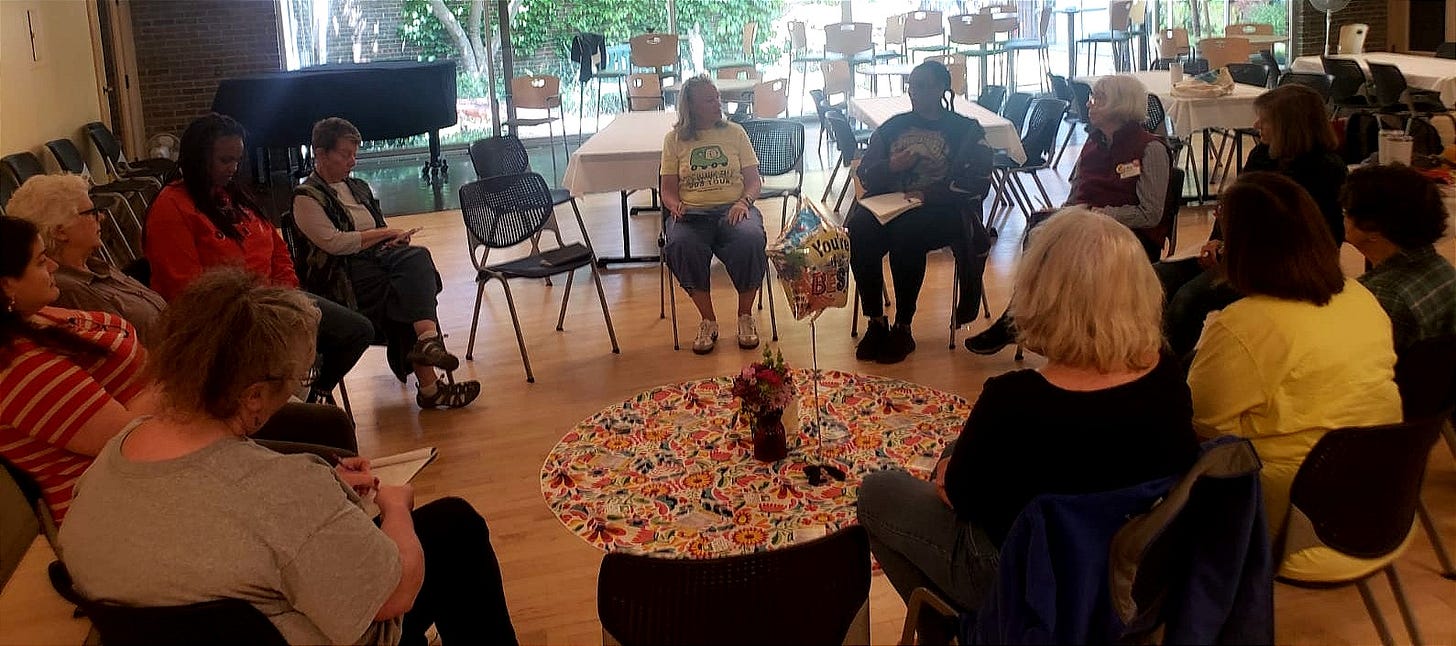
I really love doing trainings for people, but on the Sidewalk Talk bus tour, I realized I wasn't training people how to listen. I was training them on how to be curious and stay steady in the middle of chaos and complexity. (I mean you can’t get more complex and chaotic than listening to people on a public sidewalk.) I was training people on how not to believe the lenses through which they view the world. I was training people to notice how they are being influenced all the time and how to actually "go find out for yourself" what you feel, think, and believe.
But most of all, I was training people how to take a risk to talk to a stranger without trying to help them, but quite the opposite, to help create a world where caring for one another is demonstrated through caring curiosity. And listening on sidewalks is the mischievous way to make that happen. But those copywriters and consultants couldn't quite capture the depth of what I was after.
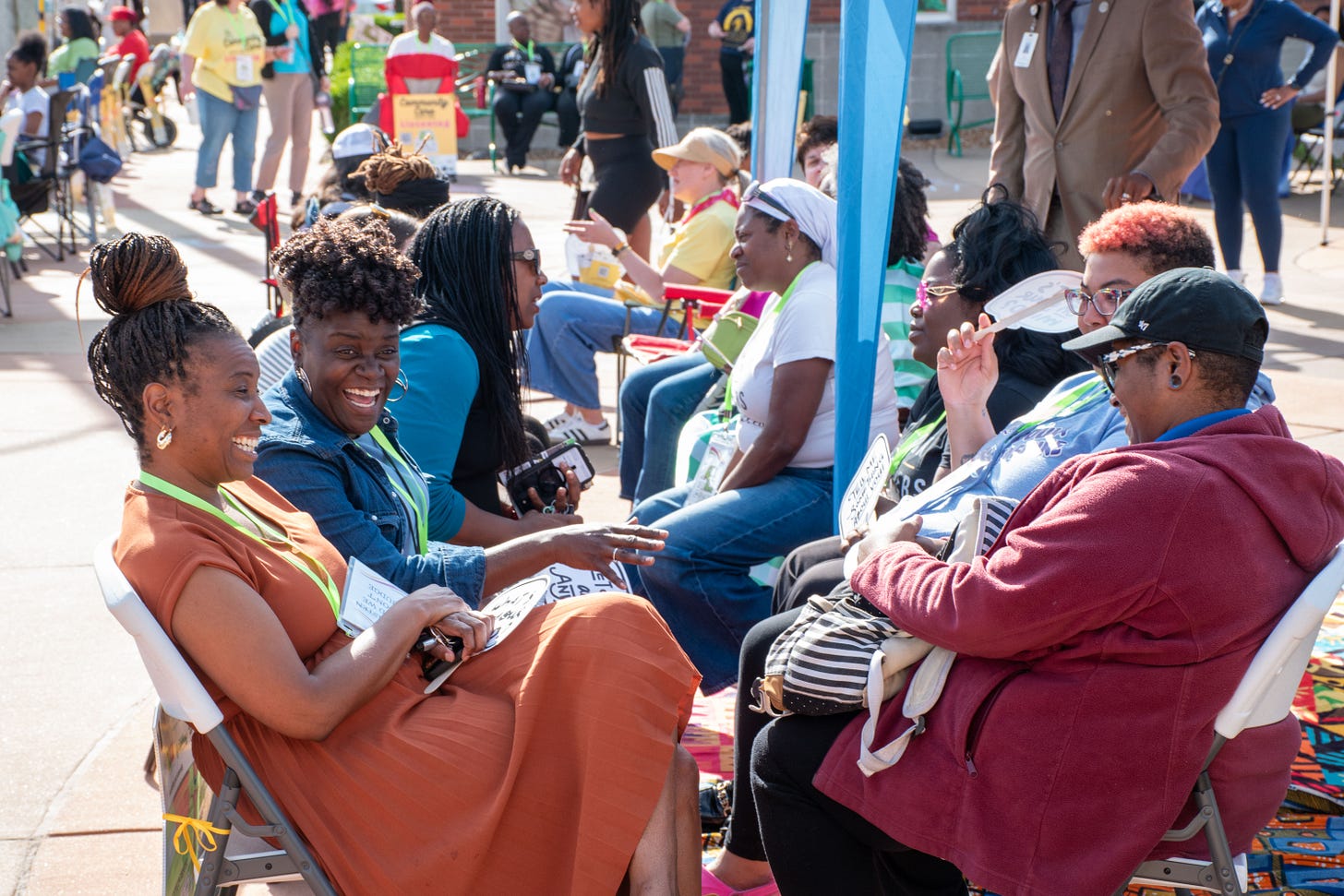
One of the freest forms of well-being we have is talking to strangers. Because talking to strangers proves wrong all the things we have been told about the world—that people are bad and dangerous. Even with war waging, I know that people want to do right by one another because of so many years listening on sidewalks. And nothing inspires us to do right by one another more than being curious and delighted in one another's humanity as a deliberate practice.
Listening on sidewalks and talking to strangers softens that deep sense of existential aloneness—that no one could possibly understand us. Even if you aren't spilling your guts, you get curious about enough people, and you will start to feel less existentially alone and less worried about the world.
The truth is, I’m not that interested in teaching listening skills. Not really. Listening is foundational, yes. But for therapists, it’s Psychotherapy 101 and for couples therapists it is a big component of our daily work. I was taking that technique and playing with it in a way that was fun for me and provoking for others. I wasn't interested in just teaching people "What I hear you saying is..." and "Did I hear that right?" training.
What I am interested in is something more untamed, more soulfully destabilizing—how to live in a world where we go find out, rather than assume we know everything. Where we meet others—and ourselves—without a the rules or a script.
How do we stay surprised—wonderstruck even—while holding onto our own boundaries?
I am not into provoking the kind of surprise or conversation that throws you into chaos or a trauma reenactment though. (Been there, ouch.) Not the kind of curiosity that turns into saviorism or emotional fusion.
I mean the kind of surprise that rearranges your noggin just a little. That teaches you something you didn’t know about someone else and yourself. The kind that wakes up your soul, not your fight-or-flight system. Your history colored glasses are altered by hearing someone else's story or simply by having a chat with someone about their new puppy.
The Neuroscience of Curiosity
Curiosity lights up the brain's reward systems—dopamine pathways, especially in the hippocampus and prefrontal cortex. I am in year two of my STAIR training with Juliane Taylor Shore and we are studying all this brain stuff right now so if I talk too much about it, apologies in advance. Juliane was a car mechanic before she became a therapist, so she explains the brain to me the way she probably explained engines to her customers. I get it more viscerally and she is really helping us therapists - no matter what model we use - what creates change for a psychotherapy client. Freudians, CBT therapists, EMDR therapists, Hypnotherapists, Constellations folks, IFS therapists and even coaches could all benefit from Juliane's training. OK that is my plug for her stuff.
Back to curiosity. Curiosity sharpens memory, enhances learning, and actually increases tolerance for ambiguity. To resolve big grievances in the world, we have to have the capacity to step back and see the whole thing with curiosity. I just had Adam Kahane on the Sidewalk Talk podcast (coming this week) - on collaborating with the enemy and habits for changing systems. He was pretty into this idea of listening to strangers on sidewalks as part of social change. But there is one caveat about curiosity. It only thrives when the nervous system feels safe enough. If the body perceives threat—emotional, social, or existential—those curiosity circuits get overridden by survival systems. And dag nabbit, the news cycle and the way we consume information falsely spins us into fight or flight every hour so we can’t lean in and solve anything because we don’t have enough curiosity available.
So if someone can’t stay curious, it’s not because they lack intelligence. It’s because their brain is trying to keep them safe. They may be locked in a sympathetic stress response or frozen in a dorsal state. No wonder surprise feels like danger.
I suppose my ADHD-gifted-trauma-wired brain was made for this. I’m wired to go down rabbit holes, to feel alive when surprised, to track what’s not being said. But with therapy, that curiosity isn’t just a reflex—it’s a deliberate practice now. A way of being that lets me find out what’s actually happening, instead of living from a fear-fueled projection. I am just so darn bothered by the way we show people information these days to threaten people and keep them in a perpetual "unsafe" state so you can side eye strangers and even your partner rather than having the capacity to be curious "huh, what are their history colored glasses seeing right now?"
The Psychodynamic Defenses Against Wonder
I am back to the nerdy analysts lately. Partly because the world is too complex not to view things from a depth lense, partly because a new pal I met through Sidewalk Talk, Sadaf Vidha and Aryan Somaiya have nudged me out of my snarky assumptions about analysis, and partly because I am so freakin' tired of simple frameworks and fix it therapy that has people using therapy to self optimize or self diagnose rather than hold the larger story arc of their wonderfully lived life. Fix-it therapy is just so boring. As an aside, I love this video by Eric Fromm that warns against this and so much more.
From a psychodynamic lens, we often use defenses like intellectualization, projection, and splitting to avoid the vulnerability that true curiosity requires. To wonder is to admit you don’t know. And that can stir up all sorts of unconscious fears:
If I don’t know, maybe I’m stupid and shit if I am stupid I am worthless.
If I stay open, maybe I’ll get hurt or taken advantage of.
If I don’t take control, maybe they will control me.
Defenses protect us from what our young selves determined was too unbearable to feel—but the sad by product is defenses block good stuff too - they block us from awe. From transformation. From the glorious, destabilizing surprise of real human contact.
And this is why I keep returning to my mantra: go find out. Because most of us are walking around inside an inherited emotional script—written by trauma, caretakers, media, ideology. I want to know what’s underneath it. What you would feel if you weren’t trying so hard to be safe and avoid what your young mind said was too dangerous to feel. How can I support you in feeling safe enough to bear it and that you would risk talking to a stranger?
As Rainer Maria Rilke wrote, "Be patient toward all that is unsolved in your heart and try to love the questions themselves." To live in this way means constantly returning to the world with fresh eyes—refusing to let even our own noble ideas become “the right idea” or the “fact of the matter”. It is to bear paradox as a kind of devotion.
Having No Boundaries in Our Wonder seeking
And then there's the flip side: when we do stay open to wonder, but we lose our boundaries in the process. This is especially true for many of us in the healing arts who started out as the emotional caretakers in our families. That early role, often born from necessity, becomes a defense mechanism—our way of managing overwhelming feelings and staying connected to others.
It's easy to get pulled into roles: the fixer, the empath, the helper, the one who "gets it." Especially for therapists who experienced emotional parentification—where we tended to our caregivers’ emotional needs instead of our own. Wonderseeking, in those cases, can become a slippery slope into caretaking. It can morph into what developmental theorist Margaret Mahler called merger—a phase where the sense of self and other is blurred.
Later theorists I love—Jessica Benjamin and Nancy McWilliams—expanded this to describe the loss of psychological boundaries between self and other in adult relationships. We become a big ball of WE, and losing the distinct ME in that dynamic.
Why does this "big ball of WE" happen? Because somewhere along the way, we learned that merger = love. We were rewarded for dissolving into others' needs and struggles. We learned that being attuned meant being absorbed. But it isn't. It's just... merger. Not connection. Not curiosity. Just a survival strategy that looks like compassion but costs us our self.
This is actually my favorite part of the Sidewalk Talk HEAR training—teaching folks to be braver about holding onto themselves. It’s still my bread and butter in couples therapy. Because here's the kicker: on some deep level, many of us believe that being needed is the same as being loved. Kapow. You feel that? That one still humbles me. I had to do so much therapy around this in the early days of Sidewalk Talk, especially when people would get angry that I asked for donations so I could hire people instead of overgiving like I did when I was a kid. But holding that boundary -hey we have to hire people to do some of the stuff I do- was my healing, too. Letting others be frustrated with my limit helped me rewire that old belief: that I only mattered if I gave until I disappeared or was burnt-out.
But this merger or boundaryless fusion isn’t curiosity. It's performing “good”. It's a survival strategy masquerading as care.
To be wonderstruck with boundaries is to:
Wander into a conversation not to fix or impress people with our caring goodness, but with who you are and what you stand for, your values in one pocket, and a little room in the other to be changed.
Let your worldview be nudged—not bulldozed—by someone else's perspective. No coercion, no cancellation threats, no manipulation. Just the humble magic of sharing stories and listening and then going, "Huh, I never thought of it that way."
Sit with what baffles you and be wonderfully uncertain and confused. Ask the weird or uncomfy question. Stay when there’s no tidy answer. Let the compass wobble and still keep moving forward.
Let delight and discomfort dance. Don’t cling to either. Don’t chase them off. Just let them pass the mic to each other and riff. So you can stay in contact with yourself and this other human in front of you.
Most people don't want this discomfort. They want the one and only right answer. There is this belief that there could be one. And I get it. It takes a nervous system that can hold paradox. A sense of self sturdy enough to withstand not knowing. Many people weren't raised with that. I wasn’t. And many therapists, frankly, weren’t either.
But me? I crave surprise like oxygen. I want to be shown something I didn’t see coming, as long as I get to bring my whole self along for the ride. As long as I can feel safe enough in this conversation and this world I can keep being curious and surprised. I don’t want to vanish in someone else’s story. I want to meet it, bow to it, learn, and remain.
This is what I really teach. This is what I continue to train in myself, my clients, and my communities:
Curiosity with a spine. Openness with a tether. Vitality without over giving.
I’m training people how to courageously test out what they see—to go into the world with fresh eyes, clear hearts, and some healthy skepticism toward their own conditioning.
So no, I’m not a listening trainer.
I’m a guide for people who want to stay alive to the world and have caring vibrant relationships and communities—without losing themselves in it. And having the mischievous audacity to talk to strangers - to set out chairs and listen on sidewalks - is one of the ways I do that.
And yes, I’ll be co-hosting a workshop soon with Street Wisdom called How to Talk to Strangers. Because what excites me isn’t just that people talk or listen, but that they step into the poetic unknown of another person and let it do something to them.
I’ve been in a bit of a personal reckoning with Sidewalk Talk, honestly. Not because it hasn’t helped me grow—it absolutely has. But the growth wasn’t about becoming a better listener. It was about becoming more honest with myself. I’ve learned how not to merge with the project, how to stop shape-shifting to please people, and how to let my full, creative, and less marketable version of ambition breathe without apology.
My ambition is not mass-market friendly. It’s not tidy or easily digestible. It’s provocative. It asks people to hold complexity.
The mantra I live by—the one Sidewalk Talk revealed to me over time—is this: Go find out.
Don’t assume. Don’t let social media lock you into a narrative. Don’t let your history-colored glasses shape everything you see—the news, politics, leaders, relationships, self-worth—without question.
Go find out.
Now, I’ll admit, that mantra has sometimes come from a trauma reflex. You know, that sneaky flavor of hypervigilance that looks like curiosity but is really just your inner kid sprinting around trying to prevent disaster by reading the room, managing others' emotions, and people-pleasing like a champ. Hypervigilance is curiosity wearing a tight blazer, sweating under the armpits, trying not to be rejected. And so, I also practice stillness. Boredom. Being unimpressive and wildly ordinary. Yep—I make boredom a practice. But it’s not just boredom—it’s ordinary and not special. The practice of being enough as I am. Not meeting every need. Not polishing myself for consumption. Letting myself be wildly ordinary and wildly true to whatever version of me shows up today. That means staying connected to my values, my feelings, my body, the earth, and my desires—and letting those guide my next move. Not the shoulds of the project. Not the expectations of the crowd. Just me, an animal in an ecosystem, playing her small and slightly eccentric part. Wildly ordinary. Occasionally brilliant. Often snack-seeking. Choosing from the inside out, not because I’m trying to impress anyone, but because my internal compass—mud-splattered and wonky as it may be—is mine. And I’d rather follow that than crowdsource my soul.
Lately, philosophers are keeping me company. Hannah Arendt reminds me that living is a radical act. That becoming attuned to what truly matters is a choice—and one we have to keep remaking. Not based on what marketers say matters. Not what influencers or even our communities say.
As Krishnamurti said, "It is no measure of health to be well adjusted to a profoundly sick society." So I keep adjusting instead toward what matters. Not what performs well, not what sells. But what makes me more human.
Through deep critical thinking, iteration, and a willingness to change when new information arrives.
That’s why I love Street Wisdom. It sources insight from the poetic and the magical. And in a world drowning in data, we need projects like Street Wisdom and Sidewalk Talk that are not about helping people per se—but about cultivating wondrous, flexible minds that can hold the beautiful mess of being human.
If that’s you, come find me. It gets messy. And it gets glorious.
Join me live for a free workshop with Street Wisdom:
How to Talk to Strangers
🗓️ Saturday, June 28
🕚 11:00 AM – 11:45 AM GMT+2
📍Live on Zoom
Sign up here
You were told not to talk to strangers. But what if that’s the worst advice for your mental health?
Join me—Traci Ruble, psychotherapist and Sidewalk Talk founder—for a lively 45-minute wander into the gentle art of saying hello (without sounding like a weirdo). Whether you're shy, chatty, or somewhere in between, you’ll leave with a little more confidence, a few laughs, and maybe a sudden urge to compliment someone’s socks.
We’ll explore:
Why your brain actually loves small talk
How to rewire your fear of rejection (with help from Kitty, an 80-year-old legend)
Simple, playful tips to break the ice and stay human
Thanks for being in this wonder-filled, weird, becoming-with-boundaries space with me.




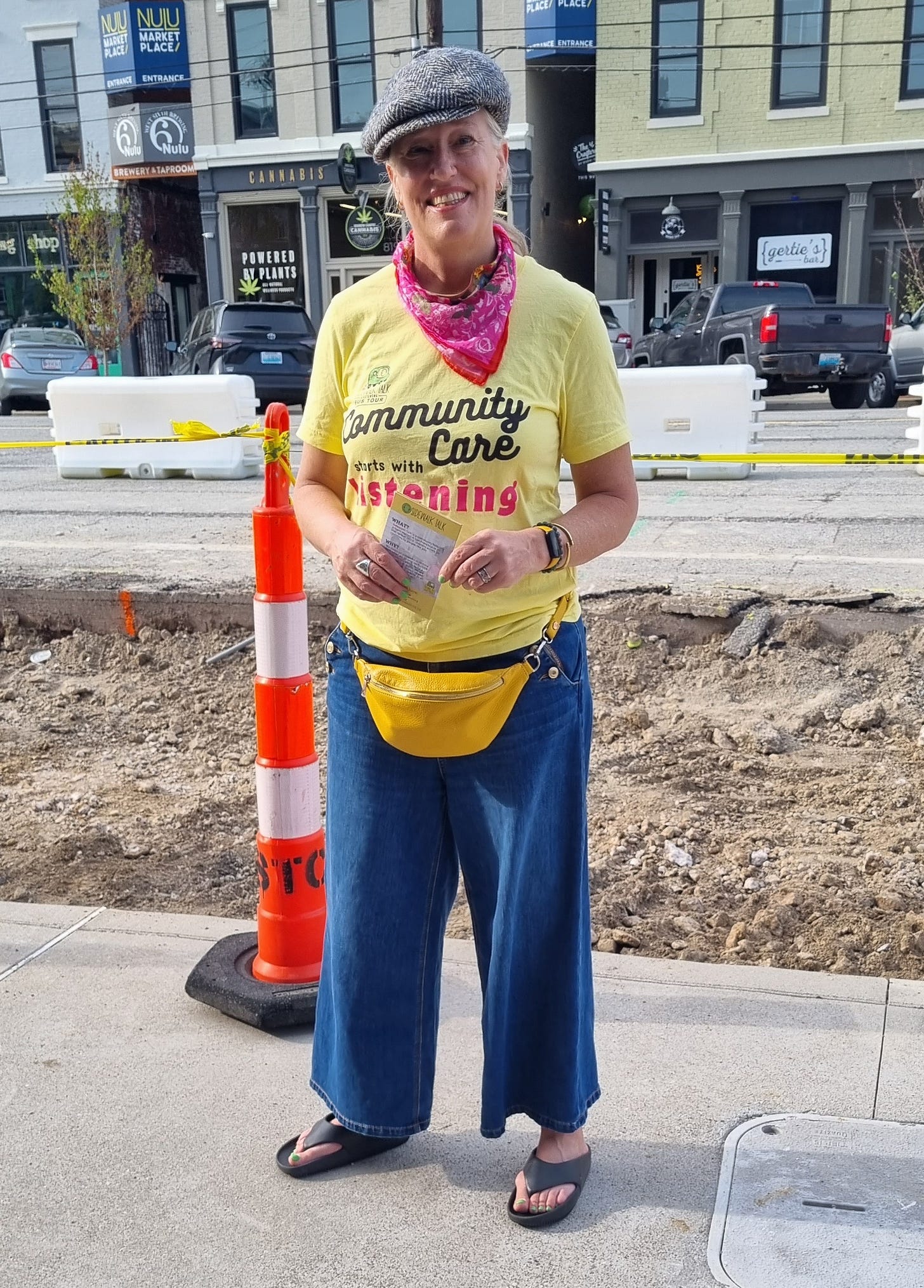
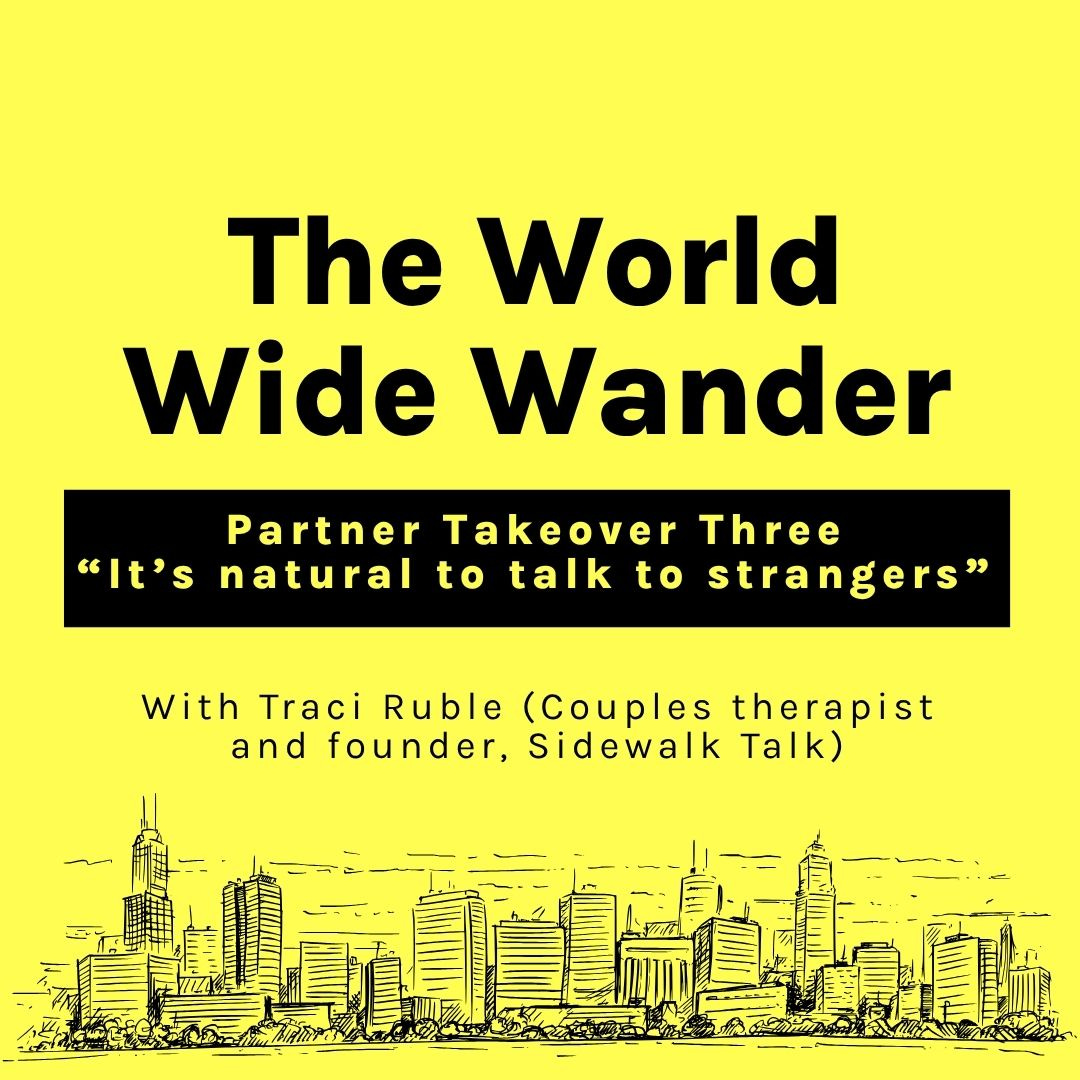
You speak to my heart and soul so deeply my dear Traci! I smile and laugh and ponder as I read your words. Anyone who chooses phrases like “dag nabbit” and quotes Rilke and Krishnamurti, shares her heart and gives massive food for thought in one article is a magical unicorn! Thank you for this piece, I will be sharing with therapist friends and others! Love you, Laurie